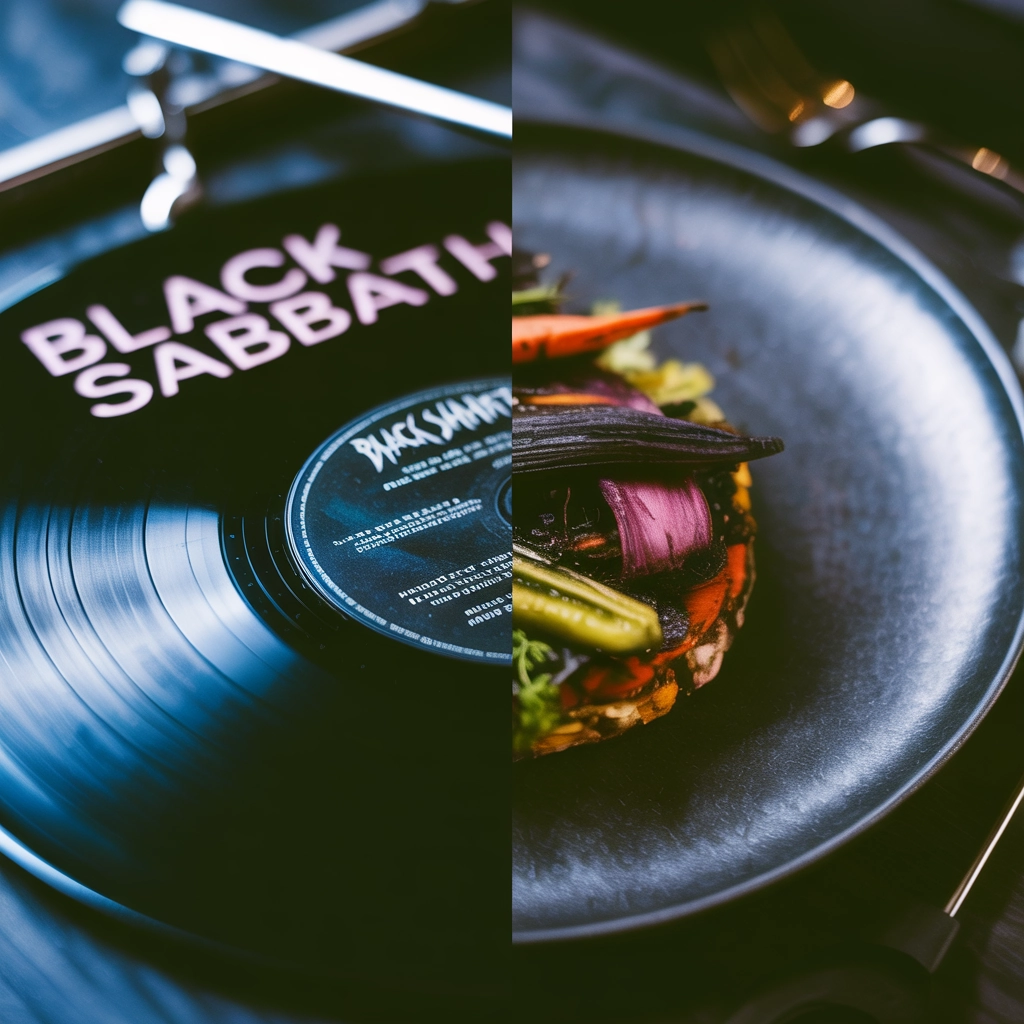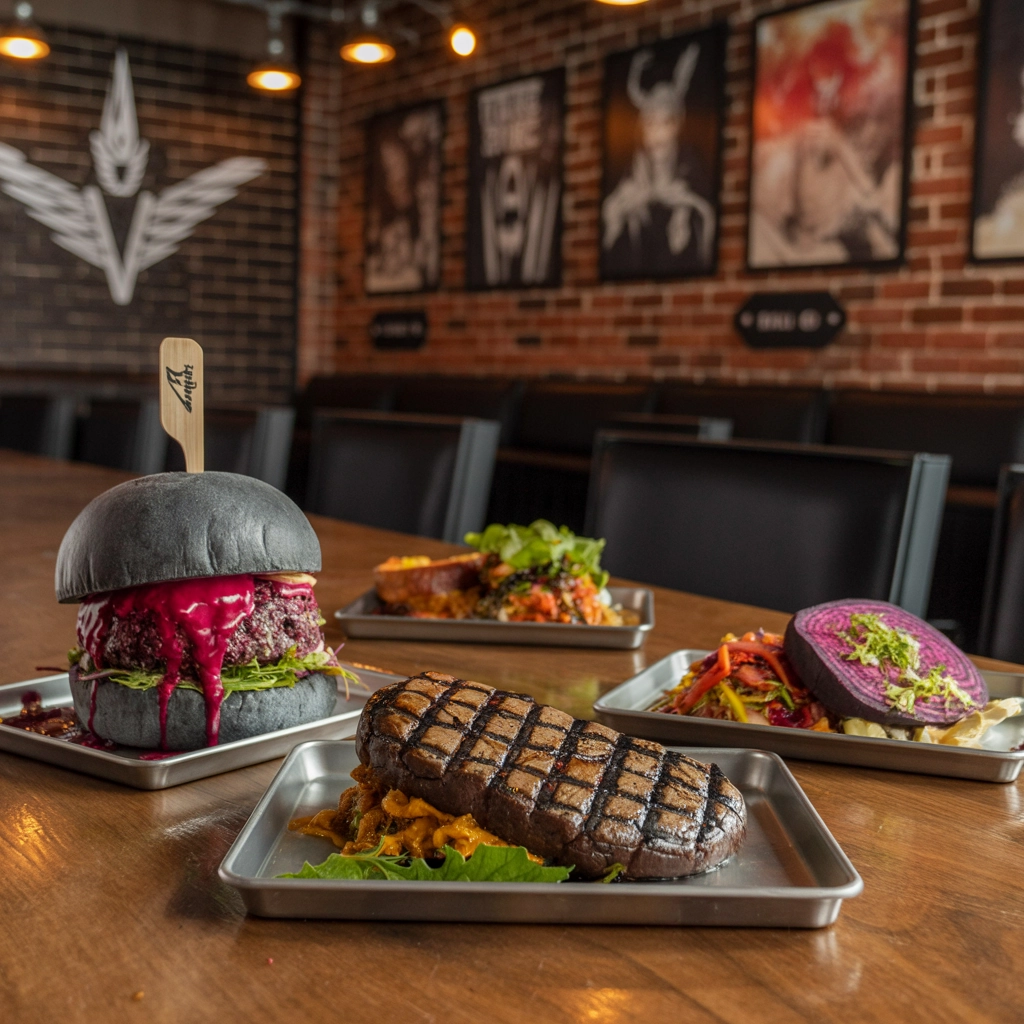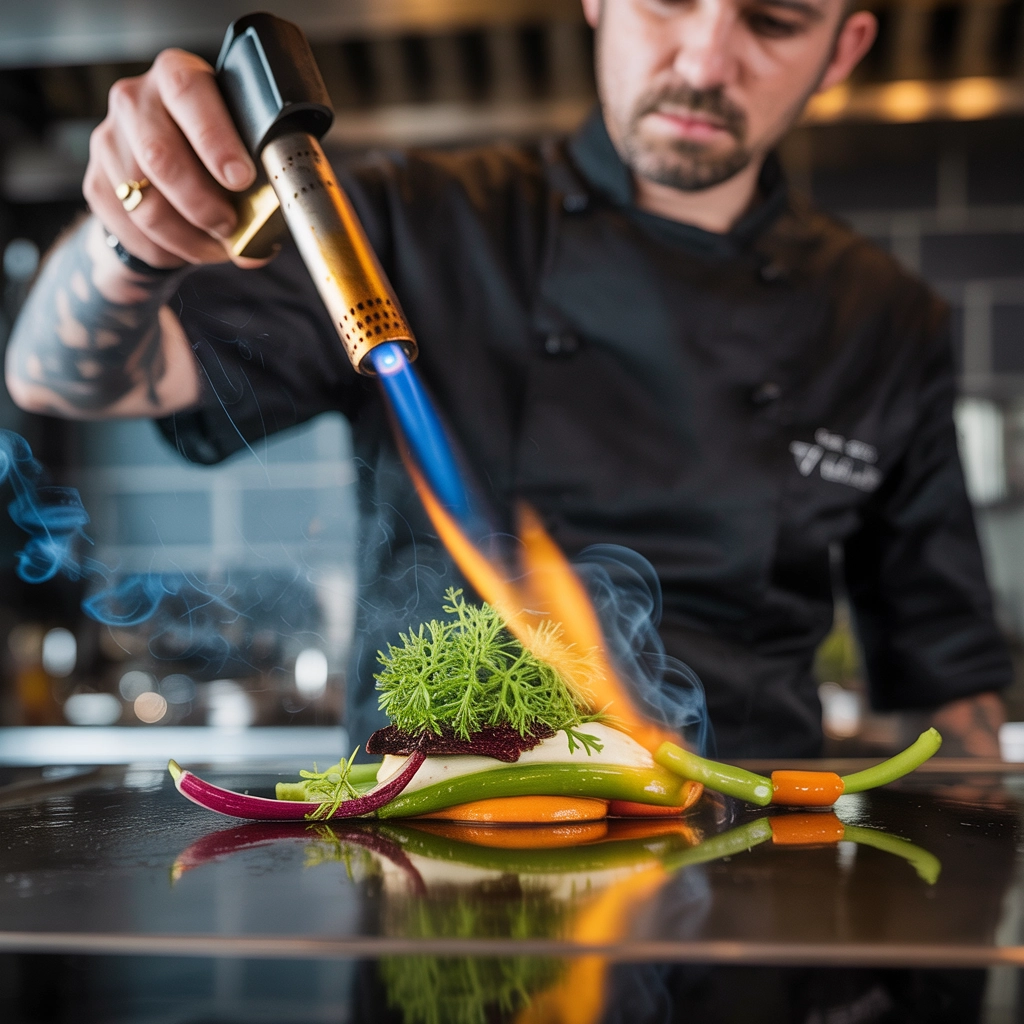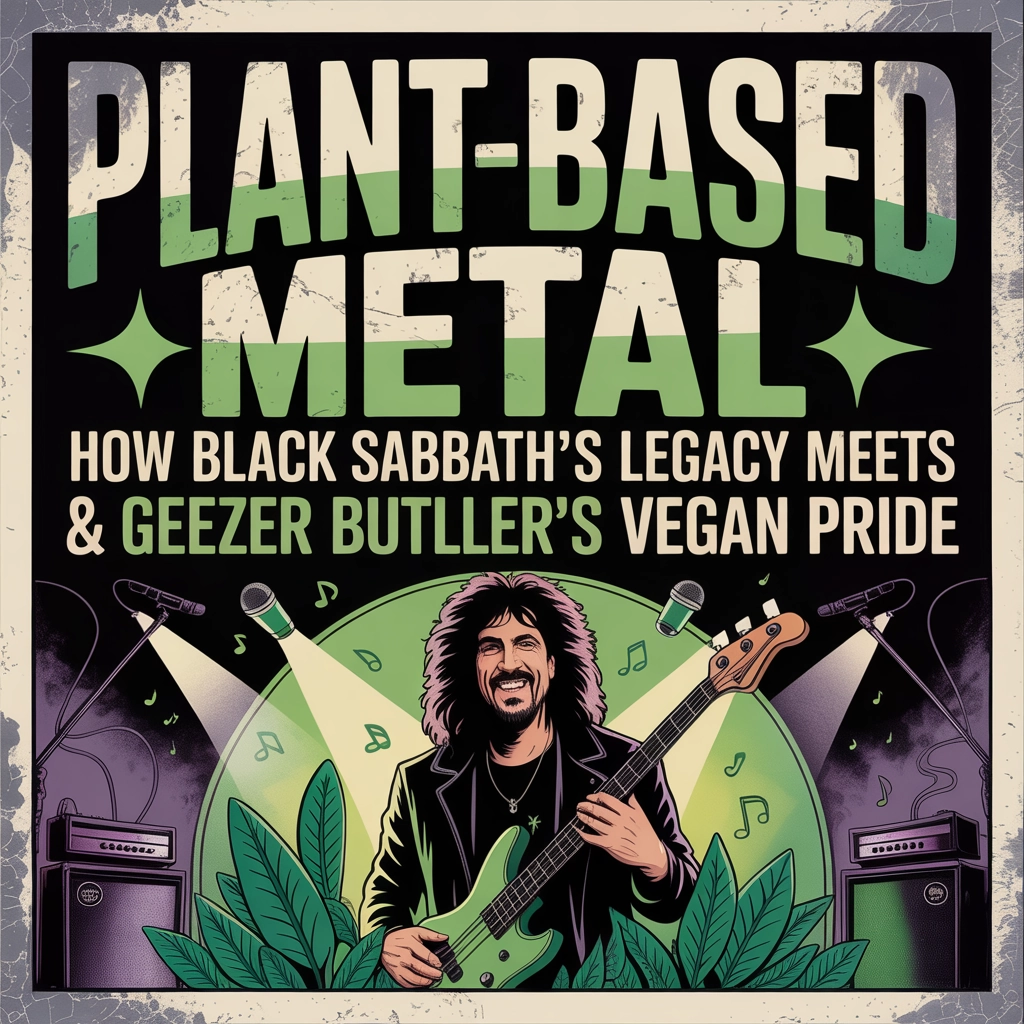When Heavy Metal Meets Plant-Based Living
In the thunderous world of heavy metal, where leather, headbanging, and dark imagery reign supreme, you might not expect to find a pioneer of plant-based living. Yet Terence “Geezer” Butler—founding member and lyricist of legendary metal band Black Sabbath—has been quietly championing veganism since long before it was trendy in culinary circles. This unexpected intersection of metal’s intensity and compassionate eating offers fascinating insights for today’s food and beverage industry professionals.
Crossroads Kitchen, the renowned plant-based restaurant by chef Tal Ronnen, holds a special place in this story—not just for its innovative vegan cuisine, but also because it’s where our publisher, Michael Politz, first met Geezer and Gloria Butler. Over a table packed with creative dishes, the legacy of rock met the promise of plant-based food, showing how even the heaviest genres can embrace a lighter, more sustainable approach.
“I became vegetarian when I was eight years old,” Butler has revealed in numerous interviews. “I was cutting into this piece of meat and blood came out of it. I asked my mother, ‘Where did this come from?’ She said, ‘From animals,’ and that was it.”
That childhood revelation eventually evolved into a lifelong commitment to veganism and animal rights that has run parallel to his groundbreaking musical career—proving that plant-based principles can thrive in even the most unexpected cultural spaces.
The Ironic Origins: Blood and Compassion in Metal’s DNA
There’s a delicious irony in Black Sabbath’s status as pioneers of a genre known for its darkness and aggression while harboring members with deep compassion for animals. While frontman Ozzy Osbourne became infamous for biting the head off a bat during a concert (though he claims he thought it was a rubber prop), Butler and drummer Bill Ward were quietly embracing animal-free lifestyles.
Butler’s convictions ran deep, influencing not just his personal choices but the band’s artistic output. As Sabbath’s primary lyricist, his concerns about war, social justice, and environmental issues permeated songs like “War Pigs” and “Into the Void.” This socially conscious undercurrent in their music demonstrated that heavy metal could be both aggressive and thoughtful—a philosophy that translates perfectly to modern culinary innovation.

From Metal Riffs to Plant Riffs: Butler’s Vegan Journey
Butler’s transition to full veganism in the early 1990s placed him decades ahead of the plant-based revolution we’re experiencing today. His journey offers valuable lessons for culinary professionals navigating changing consumer preferences:
- Authenticity matters: Butler embraced veganism out of genuine ethical concerns, not as a marketing ploy, demonstrating the importance of authentic brand values in today’s transparent marketplace.
- Consistency builds credibility: Despite pressure to conform to metal stereotypes, Butler maintained his principles throughout his career.
- Advocacy with impact: Beyond personal choices, Butler actively collaborated with PETA and the Humane Society on campaigns against animal cruelty, showing how food industry leaders can effect meaningful change.
“I don’t know why anyone would want to get a cat and then declaw them,” Butler told PETA in one campaign. “It’s like having a baby and cutting off their fingers so they don’t scratch you.”
Heavy Metal Veganism: A Growing Culinary Subculture
Butler wasn’t alone in bringing plant-based principles to metal. Today, a growing contingent of vegan metal musicians is carrying forward this unexpected tradition, including:
- Doyle Wolfgang von Frankenstein (Misfits guitarist) who launched his own vegan “Doyle’s Made in Metal” hot sauce line
- Rob Zombie, who operates a vegan restaurant
- Members of newer metal bands like Gojira and Architects who openly advocate for plant-based living
This nexus of metal and veganism has spawned unique culinary concepts, from metal-themed vegan restaurants to plant-based products with rebellious branding that appeals to alternative audiences.
For food and beverage professionals, this represents an untapped market segment where traditional “health food” marketing fails but authentically edgy plant-based offerings might thrive.

Bringing Metal Energy to Plant-Based Menus
The unlikely pairing of heavy metal aesthetics with plant-based food creates exciting opportunities for culinary innovation. Here’s how forward-thinking restaurants and CPG brands are channeling this energy:
1. Bold Flavor Profiles That Challenge Expectations
Metal culture embraces intensity, and vegan metal cooking follows suit with powerful flavors that destroy the “bland vegetable” stereotype:
- Aggressively spiced seitan “meats”
- Umami-forward fermented ingredients
- Smoked and charred vegetables that deliver primal satisfaction
Chicago’s Kuma’s Corner, a metal-themed burger joint, embraced this approach by creating the “Geezer Butler” burger—a plant-based tribute featuring bold flavors that satisfy both vegans and curious omnivores.
2. Theatrical Presentation That Creates Memorable Experiences
Just as metal bands deliver theatrical performances, metal-inspired vegan cuisine embraces presentation that creates Instagram-worthy moments:
- Activated charcoal for dramatic black colors
- Beet reductions that mimic the visual impact of blood
- Dry ice effects that recall concert fog machines
3. Subversive Naming That Challenges Conventions
Metal’s tradition of provocative language translates perfectly to menu descriptions that subvert expectations:
- “Bleeding Heart” beet burgers
- “Cattle Decapitation” mushroom steaks (named after the vegan death metal band)
- “War Pig-less BBQ” jackfruit sandwiches
How Restaurants Can Harness the Plant-Based Metal Connection
For restaurant operators looking to differentiate in the increasingly crowded plant-based space, the metal-vegan connection offers unique opportunities:
- Theme Nights: Create special events pairing metal playlists with vegan tasting menus
- Cross-Promotion: Partner with local metal bands for menu collaborations
- Authentic Storytelling: Share the surprising history of veganism in metal culture
- Bold Branding: Adopt unapologetically intense language and imagery for plant-based offerings
“The key is authenticity,” says Ethan Weisberg of Portland’s Homegrown Smoker, a vegan BBQ joint that embraces metal aesthetics. “Metal fans can spot a fake immediately. The same goes for serious vegans. You need to genuinely understand and respect both cultures to make this work.”

Butler’s Legacy: Lessons for Food Industry Leaders
Beyond the specific metal-vegan connection, Geezer Butler’s journey offers broader insights for food and beverage professionals:
1. Principles Can Coexist With Profitability
Butler never compromised his values despite operating in an industry not known for ethical considerations. Similarly, today’s most successful plant-based brands maintain integrity while achieving commercial success.
2. Early Adoption Creates Authentic Authority
By embracing veganism decades before it became mainstream, Butler established unquestionable credibility. Food brands that authentically pioneer emerging trends rather than simply jumping on bandwagons earn similar respect.
3. Cross-Cultural Connections Create Opportunity
The unexpected pairing of metal and veganism demonstrates how crossing traditional category boundaries can reveal untapped market potential—something innovative food brands continue to explore through unexpected flavor combinations and category-defying products.
The Metal-Vegan Consumer: An Emerging Demographic
Market research from Plant Based Foods Association reveals that plant-based consumers defy simple stereotypes. The subset who also identify as metal fans represent a particularly dedicated consumer segment characterized by:
- Strong brand loyalty when authentic connections are established
- Willingness to pay premium prices for products that align with their values
- Active social media engagement that amplifies brands they support
- Preference for independent businesses over corporate offerings
“These consumers aren’t just buying food—they’re making identity statements,” explains food trend analyst Sophia Mendoza. “When you understand the cultural significance behind their choices, you can create products and experiences that genuinely resonate.”
Headbanging Into a Plant-Based Future
As plant-based eating continues its march into the mainstream, the pioneering role of unexpected advocates like Geezer Butler reminds us that culinary innovation often comes from unexpected places. For today’s food and beverage professionals, this suggests the importance of looking beyond obvious trends and demographics to find authentic inspiration.
Whether you’re a restaurant operator considering a metal-themed vegan night, a product developer exploring bold new flavor combinations, or simply a food industry professional interested in understanding diverse consumer motivations, the Black Sabbath bassist’s lifelong commitment to veganism offers a compelling case study in how principled choices can shape both cultural movements and consumer preferences.
As Butler himself once said: “You can be ethical in any field or endeavor, including the music business.”
The same is true in the food business. And sometimes, the most powerful innovations happen when we bring together seemingly contradictory worlds—like the thunderous aggression of heavy metal and the compassionate ethics of plant-based eating—to create something authentically new.
Written by Michael Politz, Author of Guide to Restaurant Success: The Proven Process for Starting Any Restaurant Business From Scratch to Success (ISBN: 978-1-119-66896-1), Founder of Food & Beverage Magazine, the leading online magazine and resource in the industry. Designer of the Bluetooth logo and recognized in Entrepreneur Magazine’s “Top 40 Under 40” for founding American Wholesale Floral. Politz is also the founder of the Proof Awards and the CPG Awards and a partner in numerous consumer brands across the food and beverage sector.






